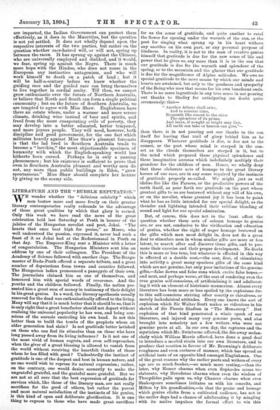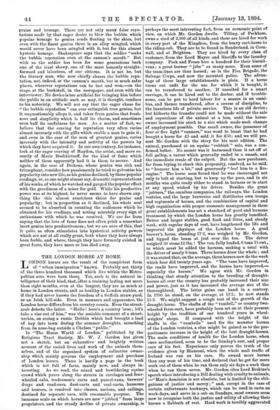LITERATURE AND THE "BUBBLE REPUTATION."
WE wonder whether the "delicious celebrity" which men bestow more and more freely on their greater literary contemporaries really redounds to the advantage of those great qualities by which that glory is earned. Only this week we have read the news of the great celebration held last Saturday at Pesth in honour of the jubilee of the Hungarian novelist and poet, Jokai. "The hearts that once beat high for praise," as Moore, who well understood the passion, expressed it, never had such a feast of it as Jokai had at the Redoutensaal in Pesth on that day. The Emperor-King sent a Minister with a letter of congratulation. The Hungarian Ministers sent him an address by one of their colleagues. The President of the Academy of Science followed with another loge. The Burgo- master of Buda-Pesth offered a separate tribute, and a great number of deputations from towns and counties followed. The Hungarian ladies pronounced a panegyric of their own. The journalists claimed him as one of themselves, and honoured him with special words of reverence. And the youths and the children followed. Finally, the nation pre- sented him a great sum of money in testimony of their delight in his great genius. In a word, the literary apotheosis usually reserved for the dead was enthusiastically offered to the living. Many will say that it is much better that it should be so, that it is only right that a great benefactor should not depart without realising the universal popularity he has won, and being con- scious of the aureole encircling his own head. Is not this better than to build the tombs of the prophets whom an older generation had slain P Is not gratitude better lavished on those who can feel its stimulus than on those who have long passed away from its living influence P Is it not one of the most vivid of human regrets, and even self-reproaches, when the giver of a great blessing is allowed to vanish from the world without receiving the heartfelt thanks of those whom he has filled with good P Undoubtedly the instinct of gratitude is one of the deepest and best in human nature, and no one would wish to repress its natural expression; rather, on the contrary, one would desire earnestly to make the ungrateful grateful, and the grateful more grateful. But we are not at all sure that the best expression of gratitude for services which, like those of the literary man, are not really sacrifices for the good of others, but rather the purest and most natural satisfaction of the instincts of his genius, is this kind of open and deliberate glorification. It is one thing to express to those who have made great sacrifices for us the sense of gratitude, and quite another to extol the flower for opening under the warmth of the sun, or the poet for singing what sprang up in his heart without any sacrifice on his own part, or any personal purpose of
kindness. In reality, it is not to the man of creative genius himself that gratitude is due for the new sense of life and power that he gives us, any more than it is to the sun that our gratitude is due for the warmth and splendour of the spring, or to the mountain and the glacier that our gratitude is due for the magnificence of Alpine solitudes. We owe no special gratitude to the mere means by which our minds and hearts are awakened, but only to the goodness and sympathy of the Being who uses that means for his own beneficent ends. There is no more ingratitude in any true sense in not pouring out thanks to Shelley for anticipating (no doubt quite erroneously) that-
" Another Athens shall arise,
And to remoter time, Bequeath like sunset to the skies The splendour of its prime, And leave, if nought so bright may live,
All earth can take or heaven can give,"— than there is in not pouring out our thanks to the sun itself for leaving that trail of glory behind him as he disappears. Whatever gratitude is due, is due not to the sunset, or the poet whose mind is steeped in the sun- set as the clouds themselves are steeped in it, but to the mind which prepared these physical splendours and these imaginative auroras which indefinitely multiply their grandeur for the children of men. Hence, we wholly deny that these elaborate acts of homage to the great literary' heroes of our race, are in any sense required by the instincts of gratitude properly so-called. We might just as well idolise fire like the Parsees, or the productive powers of the earth itself, as pour forth our gratitude on the poet whose greatest gifts to us are bestowed without any will of his own, or on the novelist, whose greatest joy it has been to paint what he has as little intended for our special delight, as the thunder and lightning intended their sublime blending of sound and light for our special admiration.
Bat, of course, this does not in the least affect the question whether these acts of solemn homage to genius are, or are not, conducive to the vivification and education of genius, whether the sight of eager homage bestowed on the gifts which men most delight in, does not do a great deal to stimulate men in whom similar gifts are more or less latent, to search after and discover these gifts, and to pro- mote their exercise and their proper development. No doubt this is more or less true, but whatever is effected in this way is effected at a double cost,—the cost, first, of stimulating into activity a great many spurious gifts of the same kind which are not genuine, but only poor imitations of the genuine gifts,—false dawns and false suns which excite false hopes,— and next, and perhaps worse, at-the cost of rendering even the true genius self-conscious, of artificialising it and adulterat- ing it with an element of histrionic mannerism. Almost every literature has been more or less spoiled by the euphuisms due to this self-conscious striving after courtly or chivalrous, or merely lackadaisical attitudes. Every one knows the sort of euphuism which Sir Walter Scott makes so ridiculous in his sketch of Sir Piercie Shafton in "The Monastery.", . But euphuism of that kind penetrated a whole epoch , of our literature, and injured many very genuine poets, anci alee brought into notoriety not a few writers . who were, not genuine poets at all. In our own day, the raptures and the mysticism which Mr. Swinburne affected, the die-away melan-
choly which William Morris affected, have done a. gag deal to introduce a morbid strain into our own literature, and to produce that reaction in favour of Mr. Browning's deliberate roughness and even curtness of manner, which has spread an
artificial taste of an opposite kind amongst Englishmen. One of the great reasons why the earlier poets and writers of every age are so much fresher,—so much more resting,—than the later, why Homer charms when even Sophocles seems too elaborate, why Herodotus charms when even the wisdom of Thucydides palls upon us, why Chaucer charms when even Shakespeare sometimes irritates us with his conceits, and Milton by his grandiosities,—is that the praise and homage which genius elicits from a cultivated audience, has not in the earlier days had a chance of adulterating it by mingling with its native impulses the formal effort to win this
praise and homage. There are not only many false repu- tations made by that eager desire to blow the bubble which popular homage to genius sends floating to the skies, but even with the finest genius there is an alloy mingled, which would never have been mingled with it, but for this almost hysteric homage. Shakespeare says that the soldier "seeks the bubble reputation even at the cannon's mouth." Bat with us the soldier has been for some generations back one of the least showy, one of the most honestly straight- forward and laborious, of our citizens. It is not he, but the literary man, who now chiefly chases the bubble repu- tation, not indeed, at the cannon's month, but in much safer places, wherever reputations can be lost and won,—on the stage, at the bookstall, in the newspaper, and even with the interviewer. No device is too artificial for bringing him before the public in an attitude such as may, it is thought, conduce to his notoriety. We will not say that the eager chase for "the bubble reputation" can ever extinguish true genius, but it unquestionably alloys it, and takes from genius that fresh- ness and simplicity which is half its charm, and sometimes even half its usefulness for man. As a matter of fact, we believe that the craving for reputation very often varies almost inversely with the gifts which enable a man to gain it ; and even in the case of the men of greatest genius, varies inversely with the intensity and activity of the powers by which they have acquired it. In our own century, for instance, look at the eager craving of Haydon, the artist, and more re- cently of Marie Bashkirtseff, for the kind of fame which neither of them apparently had it in them to secure. And again, in the case of Dickens, whose genius was rich and triumphant, consider how passionately he tried to galvanise his popularity into new life, as his genius declined, by those popular readings, or, as one might almost say, dramatic representations of his works, of which he watched and gauged the popular effect with the greediness of a miser for gold. While his productive power was at its highest, he never seems to have shown any- thing like this almost avaricious thirst for praise and popularity; but in proportion as it declined, his whole soul seemed to be absorbed in counting the audiences which he obtained for his readings, and noting minutely every sign of enthusiasm with which he was received. We are far from saying that the love of fame does not often prick a somewhat inert genius into productiveness ; but we are sure of this, that it quite as often stimulates into hysterical activity powers which are not at all really great, both where they have always been feeble, and where, though they have formerly existed in great force, they have more or less died away.







































 Previous page
Previous page